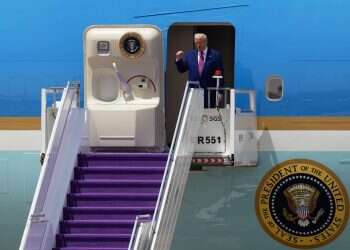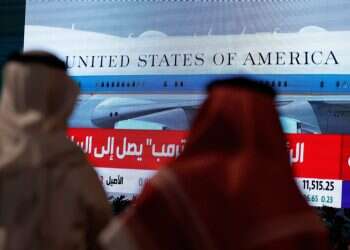Saudi Arabia's top diplomat on Saturday downplayed talk of normalization with Israel after the kingdom opened its airspace to Israeli commercial flights and hammered out a complex deal over islands in the Red Sea that required Israeli assent.
Follow Israel Hayom on Facebook, Twitter, and Instagram
Biden told Arab leaders on Saturday that the United States would remain an active partner in the Middle East, but he failed to secure commitments to a regional security axis that would include Israel or an immediate oil output rise.
"The United States is invested in building a positive future of the region, in partnership with all of you – and the United States is not going anywhere," he said, according to a transcript of his speech.
Biden, who began his first trip to the Middle East as president with a visit to Israel, presented his vision and strategy for America's engagement in the Middle East at an Arab summit in Jeddah.
The summit communique was vague, however, and Saudi Arabia, Washington's most important Arab ally, poured cold water on US hopes the summit could help lay the groundwork for a regional security alliance – including Israel – to combat Iranian threats.
Saudi Arabia's Foreign Minister Prince Farhan bin Faisal spoke to reporters after a four-day visit by US President Joe Biden to the region, including two days that the US leader spent in Saudi Arabia, where he held talks with the Saudi king and the crown prince, the de facto ruler of the kingdom, and took part in a summit of regional leaders.
Prince Farhan stressed there was no discussion at the summit of any military cooperation with Israel or talk of a so-called "Arab NATO."
"There is no discussion about a defensive alliance with Israel," he repeated.
Subscribe to Israel Hayom's daily newsletter and never miss our top stories!
Al Saud told reporters that Riyadh's decision to open its airspace to all air carriers had nothing to do with establishing diplomatic ties with Israel and was not a precursor to further steps.
Speaking to CNN, Saudi Minister of State for Foreign Affairs Adel al-Jubeir said Saturday that the Saudis had "already said that [they] support the Arab peace proposal."
Saudi Arabia has made it clear that peace would come at the end of that process, not at its beginning, Al-Jubeir told the US news channel. Al-Jubeir said that peace was "possible," but there were a number of things that had to precede it, including the establishment of a Palestinian state whose capital was east Jerusalem.
During a meeting with Saudi Crown Prince Mohammed bin Salman, Biden raised the highly sensitive issue of human rights, drawing countercriticism from the crown prince.
"We believe there's great value in including as many of the capabilities in this region as possible and certainly Israel has significant air and missile defense capabilities, as they need to. But we're having these discussions bilaterally with these nations," a senior administration official told reporters.
A plan to connect air defense systems could be a hard sell for Arab states that have no ties with Israel and balk at being part of an alliance seen as against Iran, which has a strong regional network of proxies including Iraq, Lebanon and Yemen.
Biden has focused on the summit with six Gulf states and Egypt, Jordan and Iraq, while downplaying the meeting with MBS, which drew criticism in the United States over human rights concerns.
Biden came to Saudi Arabia hoping to reach a deal on oil production to help drive down gasoline prices that are driving inflation above 40-year highs and threatening his approval ratings.
He leaves the region empty-handed but hoping the OPEC+ group, comprising Saudi Arabia, Russia and other producers, will boost production at a meeting on Aug. 3.
"I look forward to seeing what's coming in the coming months," Biden said.




